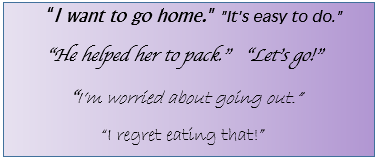Certain verbs may be followed by an infinitive, a base verb, or a gerund. Some take an object and others do not. Some verbs, such as ‘ask’ or ‘remember’, have more than one option depending on context.
Verb plus infinitive
Common verbs are: agree, ask, offer, promise, refuse, want, need, expect, and so on. (Notes: 1. These are mostly verbs related to speech or to emotional needs. 2. It is that person who agrees, offers, wants etc.)
He agreed to go. She wanted to see the movie. He promised to meet her at 8pm.
Verb plus object plus infinitive
Common verbs plus object plus infinitive are: ask, beg, encourage, order, persuade, tell, want, and so on. (Notes: 1. Again these are related to speech or emotional needs. 2. The object (usually another person) is the target of the verb.)
He asked her to sit down. She told him to shut up. I persuaded her to do it.
Note: Some verbs can come with or without the object, with different focus:
He wanted to come. Vs. He wanted her to come. He asked to ride the rollercoaster. Vs. He asked her to ride it.
Verb plus base form
The verbs are help, let, make.
He helped her (to) pack. She let him do it. He made her pay for his help.
(Notes: ‘to’ is optional after help, but is not possible with let or make. The passive of make uses to – She was made to pay. The passive of let uses a different verb – He was allowed to do it.
Adjective plus infinitive
Are you too tired to work? He was happy to go home. I’m sad to say.
Preposition plus gerund (including phrasal verbs and verbs that take a preposition)
Before entering, please wash your hands. I’m worried about meeting her.
I apologized for breaking the vase. I gave up waiting and went home.
Note: phrasal verbs ending in ‘to’ use the gerund. I’m looking forward to seeing her. I’m not used to doing it.
Verb plus gerund
Some verbs are followed by a gerund: admit, deny, regret, suggest, and so on.
I regret going to the party. He admitted murdering the woman. She suggested going to a café.
Verbs with infinitive or gerund
There are two types: those which effectively have the same meaning, and those with different meanings.
The same meaning: begin, start, continue.
It began to rain./It began raining. He started to run./He started running.
Different meanings: remember, forget, try, stop, mean, regret, like, love, and so on.
(Don’t forget to/Remember to) lock the door. (something that should be done)
I remember locking the door. (have a memory of this action)
I tried to pass the test, but failed. (attempt)
I tried making Thai curry last week. (experience)
He stopped (walking) to talk to his friend. (stop doing one action in order to do the 2nd.)
He stopped talking to his friend. (quit, ended)
Getting promoted means working harder. (leads to/causes)
I didn’t mean to drop it. (mistake)
I regret eating so much pizza. (wish I hadn’t)
I regret to inform you that your house was destroyed in a fire this morning. (sorry to say)
I like/love/hate to get up early in the mornings because it is quiet. (preference)
I like/love/hate getting up in the mornings. (enjoyment)
ラボール英会話教室.png)

